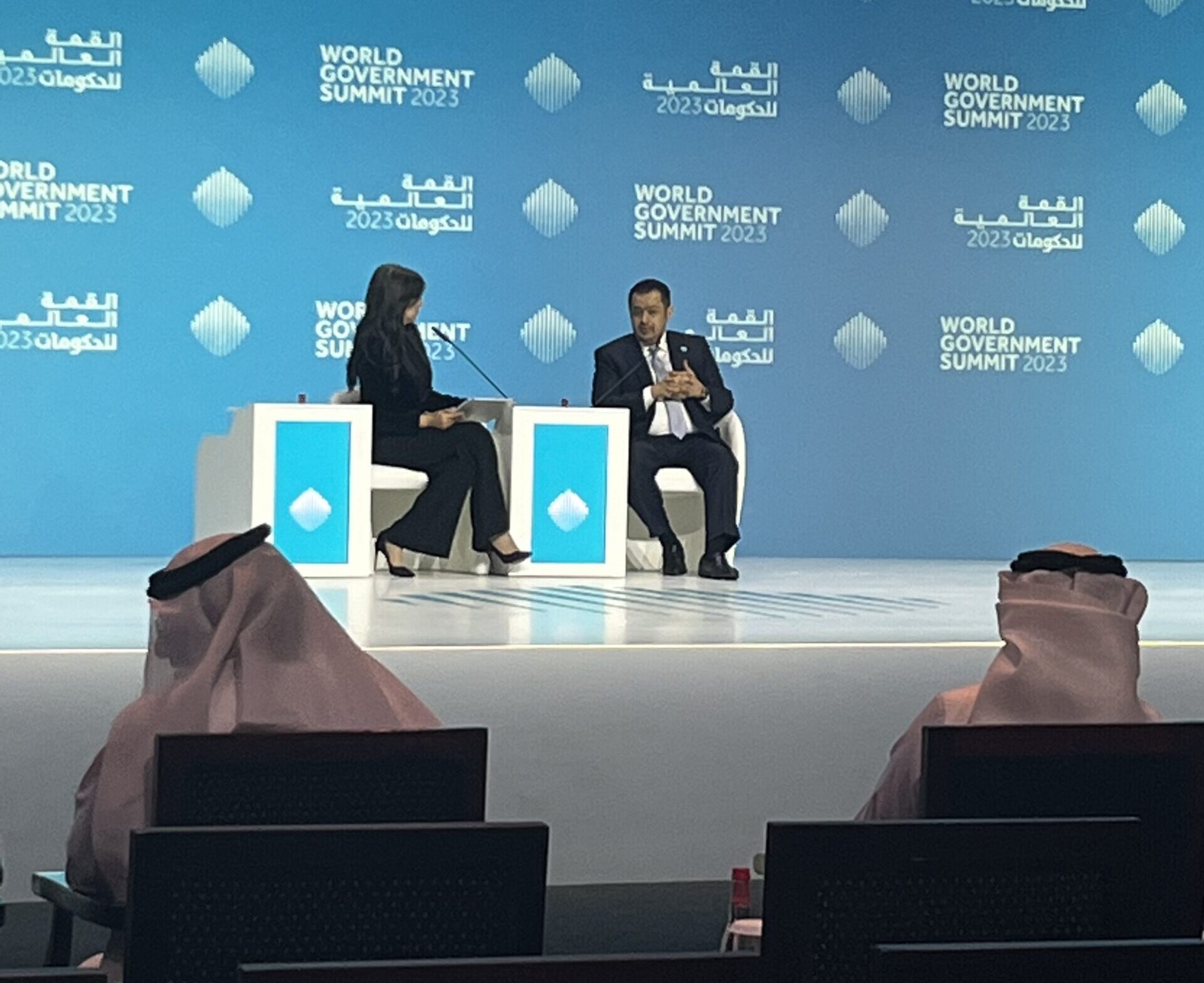After Decade of Civil War, Yemen Is In ‘Critical Stage,’ Prime Minister Says
Yemen has fallen but not collapsed thanks to the support of some neighboring Gulf countries, Dr. Maeen Abdulmalik Saeed told the World Government Summit in Dubai
(Dubai) Yemen has been through hard times in the last decade due to a long-running civil war, exacerbated by a global pandemic, but now the country is going through a “critical stage,” the country’s prime minister said.
Dr. Maeen Abdulmalik Saeed, prime minister of Republic of Yemen, the country’s internationally recognized government, told attendees at the World Government Summit in Dubai on Tuesday that, due to the support of some neighboring countries in the Gulf, Yemen fell a few times but it did not collapse.
“Geographically Yemen is part of the region, and we have the right to look forward to a better future. We have to overcome the effect of the war and we can do that with the support of GCC countries,” Saeed said.
The civil war in Yemen between the internationally recognized government supported by a Saudi-backed coalition of Arab states and the Iran-backed Houthi rebels, which began in 2014, has created one of the worst humanitarian crises of the modern era.
A UN-brokered cease-fire between the warring sides in the Yemen conflict expired in October 2022 after six months, leading to the outbreak of new, sporadic armed confrontations across the country. The civil war in Yemen broke out when the Houthi insurgent group stormed several northern cities and forced the government out of the capital, Sanaa, in northern Yemen. The government is now located in its capital-in-exile, Aden, in southern Yemen. President Abed Rabbo Mansour Hadi resigned in January 2015. A month later, he rescinded his resignation, and in March of the same year, a Saudi-led coalition intervened against the Houthis.
The country’s economy also has come close to collapse but managed to stay afloat, according to Saeed.
If it weren’t for reform and our resilience we would have completely collapsed. But our ability to be resilient is being depleted. Salaries are at their lowest, the purchasing power is in a dire situation.
In 2021, Yemen’s currency depreciated, which reduced purchasing power and pushed the ability to purchase many basic necessities out of the reach of most Yemenis.
“The budget has shrunk greatly. We reached an 80% deficit, and the central bank was in difficulty,” Saeed said. The minister added that the situation is different now and the deficit shrunk to 54%, then 35% and finally to 15% in September 2022.
The prime minister praised the fact that Yemen’s currency did not collapse, unlike other countries in similar situations.
“If it weren’t for reform and our resilience we would have completely collapsed. But our ability to be resilient is being depleted. Salaries are at their lowest, the purchasing power is in a dire situation,” he warned.
“We have 8,900 schools and more than 2 million students but there is the war generation. We are far away from the numbers that we had before 2011,” he added.
The prime minister said that, despite political differences, the coalition government is focused on “saving” the Yemeni people. “We are in a better situation now,” he added.
The government is interested in helping the Yemeni people despite how difficult it is to plan given the situation in the country, according to Saeed. “We have a long way to catch up,” he said.
“We began to think differently, we have short-term and long-term plans when it comes to supporting energy and other services,” he explained.
Saeed said Yemen is not in the right position now for big investments; however, they aim to “break even.” He said removing the subsidies from fuel early in the civil war was one of the most difficult decisions that the government needed to make, but a necessary one.
“We needed to do it because without strong supervision support turns into a black hole,” he said. “The decisions were not easy,” he added.
He said the time to work for peace is now.
“Some say that we have to wait for peace, but it can come after seven years, and by then we won’t have institutions to protect. We must work now,” he said.
The World Government Summit is an annual event held in Dubai, United Arab Emirates, that brings together leaders and experts from various fields to discuss global challenges and propose solutions for shaping the future of government. It was first held in 2013 and since then it has grown into a significant platform for policymakers, thought leaders and innovators to share their ideas and experiences. The summit, this year running from February 13-15 under the banner of “Shaping Future Governments,” and including presidents, government ministers and officials, heads of international organizations and companies, thought leaders, global experts and prominent business leaders from the private sector representing around 100 economies, covers a wide range of topics, including artificial intelligence, climate change, health care and education. Its aim is to foster collaboration and encourage innovation toward building a better future for humanity.


